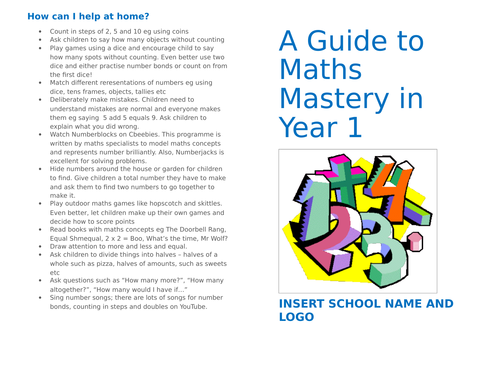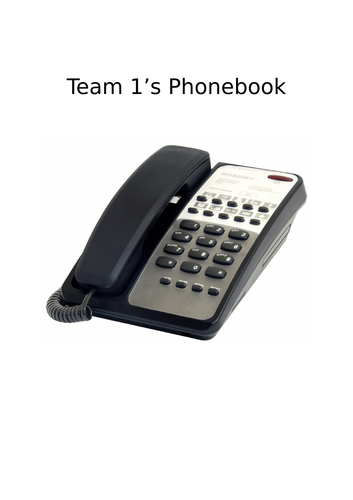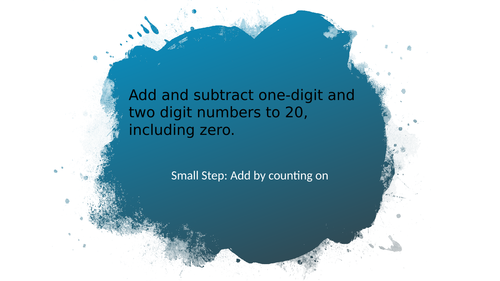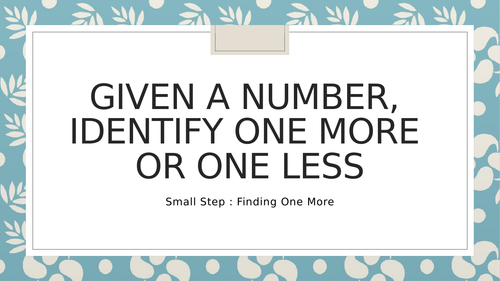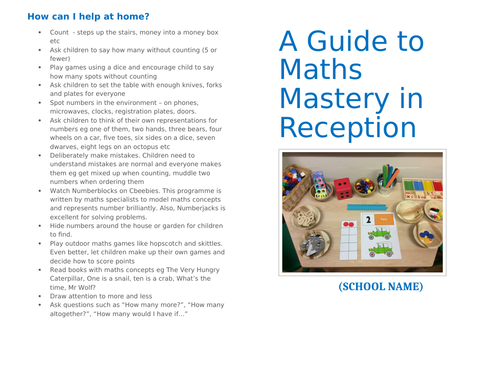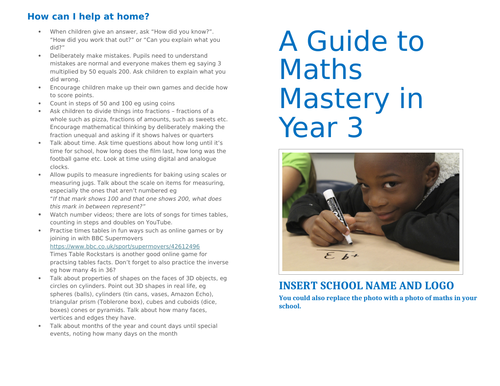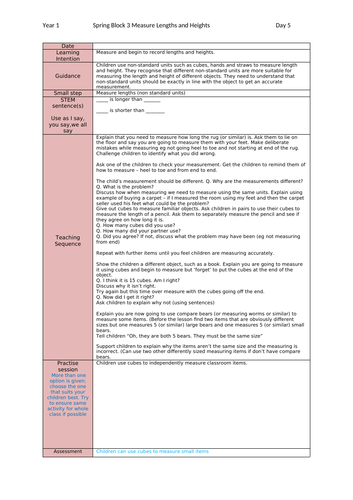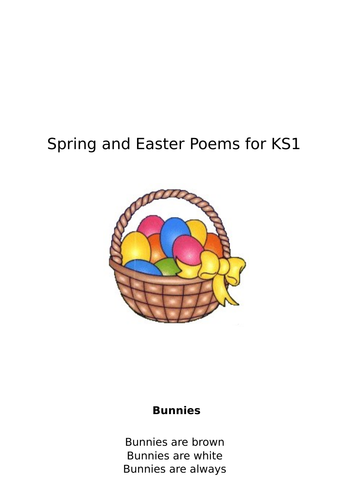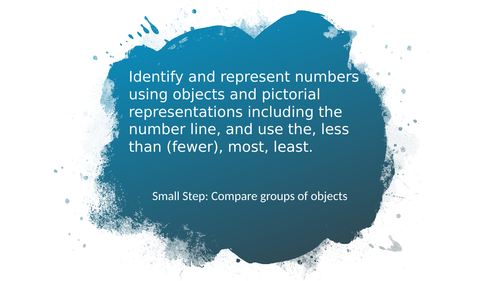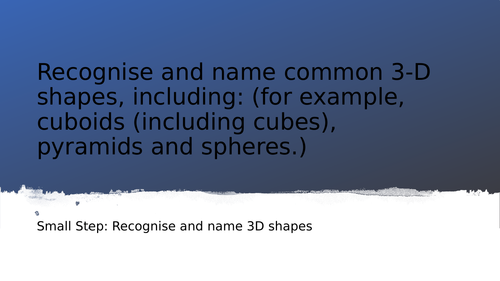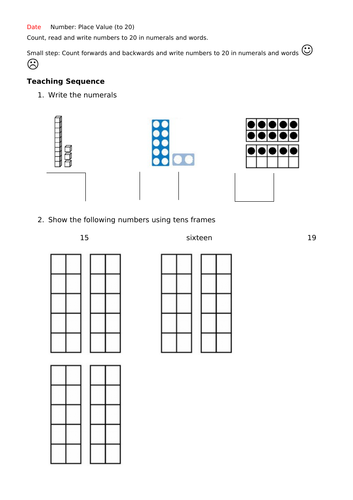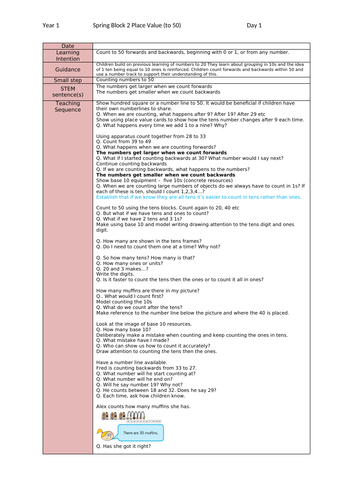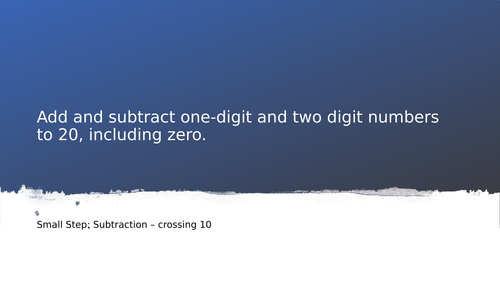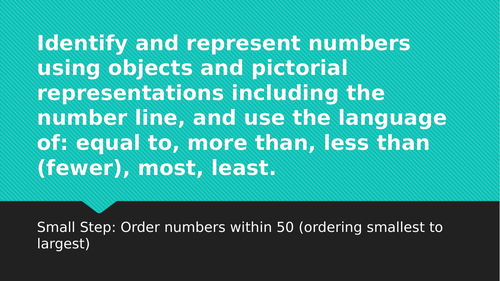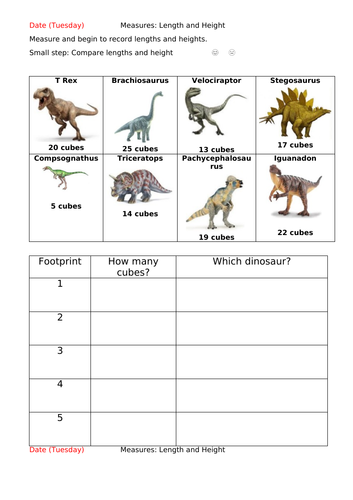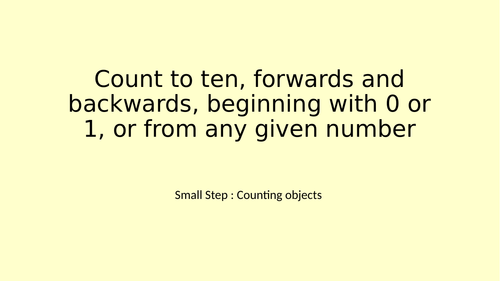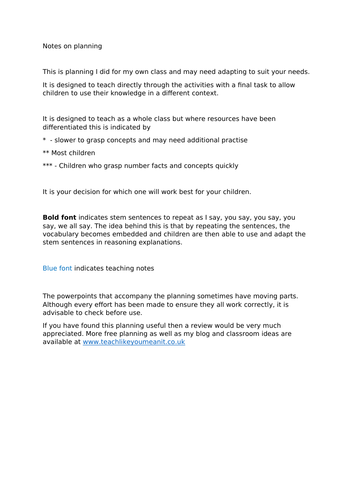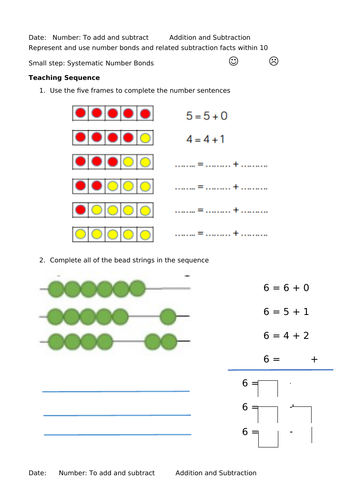27Uploads
59k+Views
135k+Downloads
All resources

A Collection of Winter Poetry suitable for EYFS and KS1
Over 25 poems about Winter, Christmas and Winter weather gathered in a collection for EYFS and KS1.
The booklet could either be printed and used as a book or the poems used individually for performances.

A Guide To Mastery In Maths In Year 1 (for parents)
This is a parents' guide to teaching for Mastery in Maths for Year 1.
It explains a Mastery teaching approach, explains to parents about the concept of Mastery and gives examples for how to help at home.
Includes sections on Fluency, Reasoning and Problem Solving with images and examples to make it easy to understand.
It is designed to print double sided along the short edge to create a booklet.
It is fully editable and I have noted the places where a school name, logo or your photos could be added.
I also have a free copy of a similar guide for EYFS.

EYFS Character Phonebook to practise number recognition and communication
A mock phonebook featuring popular characters and phone numbers. This could be used in a role play area or maths area alongside a phone to encourage children to recognise and use numbers, engage on imaginative conversation, practise team work and turn taking and speaking and listening.
It is fully editable and includes pages to add staff photos and (mock) phone numbers.

Y1 Maths Mastery Planning Spring Block 1 Week 1 Addition and Subtraction to 20 Includes Resources
4 days of Y1 Maths planning based on a Mastery Maths principle incorporating Varied Fluency, Reasoning and Problem Solving Skills - including questions to ask and misconceptions that might occur plus a choice of Practise sessions - both practical and written - for children to apply their skills independently. An example Stem Sentence to use each lesson is also included. Each lesson also includes an animated PowerPoint that breaks down the maths visually. It also includes ideas for continuous provision.
Based on the White Rose small steps approach, the NCETM mastery approach and using examples from both these, NRICH and my own ideas.
Each day includes sheets to record the steps in the lesson as you go, although some sessions could also be done directly into books. These have been used in more than one class and children showed good progression in learning and excellent understanding and application of skills on the practise examples.
This example includes lessons on:
Add by counting on
Find & make number bonds
Add by making 10
Subtraction – Not crossing 10
I am planning on adding more examples if these are useful. Please note, these are plans based on my own class and should be adapted to suit the needs of your own children. Weekly plans can have anything from 3-5 lessons on it, depending upon what is going on in school, although I try to average 4. A ‘spare’ day can be used for consolidation / additional problem solving / assessment etc.

Y1 Maths Mastery Planning Spring Block 2 Week 2 Place Value to 50
***Updated for 2019 ***
4 days of Y1 Maths planning based on a Mastery Maths principle incorporating Varied Fluency, Reasoning and Problem Solving Skills - including questions to ask and misconceptions that might occur plus a Practise session for children to apply their skills independently. Stem Sentences to use each lesson are also included along with ideas for continuous provision and a worksheet and practical independent task to choose between.
PLEASE NOTE: The preview sometimes makes pages look unformatted. These are fine when opened in Word.
Based on the White Rose small steps approach, the NCETM mastery approach and using examples from both these, NRICH and my own ideas.
Each day includes sheets to record the steps in the lesson as you go, although some sessions could also be done directly into books. Previous plans in Autumn have been used in more than one class and children showed good progression in learning and excellent understanding and application of skills on the practise examples.
This example includes lessons on:
One more, one less (focus on one more)
One more, one less (focus on one less)
Compare objects within 50
Compare numbers within 50
I am planning on adding more examples if these are useful. Please note, these are plans based on my own class and should be adapted to suit the needs of your own children. Weekly plans can have anything from 3-5 lessons on it, depending upon what is going on in school, although I try to average 4. A ‘spare’ day can be used for consolidation / additional problem solving / assessment etc.

A Guide to Mastery In Maths in Year 2
This is a parents’ guide to teaching for Mastery in Maths for Year 2.
It explains a mastery teaching approach, explains to parents about the concept of Mastery and gives examples for how to help at home.
Includes sections on fluency, reasoning and problem solving with images and examples to make it easy to understand.
It is designed to print double sided along the short edge to create a booklet. It is fully editable and I have noted the places where a school name, logo or your photos could be added. The photos attached are a small sample of the guide.
I have also written a similar guide for EYFS and Year 1. All three are available separately, in a bundle package at a reduced price or Year 1 and Year 2 are available as a package.

A Guide to Mastery Maths in EYFS
This is a parents’ guide to teaching for Mastery in Maths for Reception.
It explains our teaching approach, explains to parents about the concept of Mastery and gives examples for how to help at home.
It is fully editable and I have noted the places where a school name or logo could be added. The attached photos show some sample snapshots.
I have also written a similar guide for Year 1 and Year 2.

A Guide to Mastery Maths in Year 3
This is a parents’ guide to teaching for Mastery in Maths for Year 3.
It explains a mastery teaching approach, explains to parents about the concept of Mastery and gives examples for how to help at home.
Includes sections on fluency, reasoning and problem solving with images and examples to make it easy to understand.
It is designed to print double sided along the short edge to create a booklet. It is fully editable and I have noted the places where a school name, logo or your photos could be added. The photos attached are a small sample of the guide.
I have also written a similar guide for EYFS , Year 1 and Year 2. All three are available separately, in a bundle package at a reduced price or Year 1 and Year 2 are available as a package.

Y1 Maths Mastery Plans Spring Block 3 Week 2 Measures Length and Height
*** UPDATED FOR 2019 ***
4 days of Y1 Maths planning based on a Mastery Maths principle incorporating Varied Fluency, Reasoning and Problem Solving Skills - including questions to ask and misconceptions that might occur plus a Practise session for children to apply their skills independently. An example Stem Sentence to use each lesson is also included. Some lessons also have Powerpoint presentations.
PLEASE NOTE: The preview sometimes makes pages look unformatted. These are fine when opened in Word.
Based on the White Rose small steps approach, the NCETM mastery approach and using examples from both these, NRICH and my own ideas.
Each day includes sheets to record the steps in the lesson as you go, although some sessions could also be done directly into books. Previous plans in Autumn have been used in more than one class and children showed good progression in learning and excellent understanding and application of skills on the practise examples.
This example includes lessons on:
Measuring Objects (using non standard measures)
Measuring Objects (using cm to 30)
I am planning on adding more examples if these are useful. Please note, these are plans based on my own class and should be adapted to suit the needs of your own children. Weekly plans can have anything from 3-5 lessons on it, depending upon what is going on in school, although I try to average 4. A ‘spare’ day can be used for consolidation / additional problem solving / assessment etc.

A collection of Poems about Spring and Easter suitable for KS1 and EYFS
This resource is a book of 40 poems suitable for KS1 on the theme of Easter and Spring.
They were mostly chosen on the basis that they would be easy to learn for assemblies or church services. They could also be used as a basis for writing own poetry.
The whole pack could be printed and bound as a book.
Authors have been attributed where available.
We also have a Winter themed set of poetry available.

Autumn Maths Mastery Planning Block 4 Week 2 Place Value to 20
4 days of Maths teaching for Mastery planning, incorporating varied fluency, reasoning and problem solving. Each day includes:
Planning incorporating conceptual and procedural variation, fluency, representations, questioning to promote mathematical thinking.
Ideas for Y1 enhanced continuous provision.
Powerpoints of representations to complement the planning
Worksheets and activities to support - including a choice of worksheet or practical or paired activity
This pack includes:
Comparing groups of objects
Comparing numbers
Ordering groups of objects
Ordering numbers to 20

Autumn Year 1 Block 3 planning and resources Shape
***UPDATED FOR 2018-19 ***
5 days of Y1 Maths planning based on a Mastery Maths principle incorporating Varied Fluency, Reasoning and Problem Solving Skills plus a Practise session for children to apply their skills independently. Lessons include Powerpoints, resources and ideas for continuous provision.
Based on the White Rose small steps approach, the NCETM mastery approach and using examples from both these, NRICH and my own ideas.
Each day includes sheets to record the steps in the lesson as you go, although some sessions could also be done directly into books. They have been used in more than one class and children showed good progression in learning and excellent understanding and application of skills on the practise examples.
This example includes lessons on:
Identifying 3d shape
Sorting 3d shape
Identifying 2d shape
Sorting 2d shape
Patterns using 2d and 3d shape

Year 1 Autumn Block 4 Week 1 Place Value to 20 Lesson Plans, resources and powerpoints
4 days of Maths teaching for Mastery planning, incorporating varied fluency, reasoning and problem solving. Each day includes:
Planning incorporating conceptual and procedural variation, fluency, representations, questioning to promote mathematical thinking.
Ideas for Y1 enhanced continuous provision.
Powerpoints of representations to complement the planning
Worksheets and activities to support - including a choice of worksheet or practical or paired activity
This pack includes:
Counting backwards and forwards (to 20)
Numbers 11-20
Tens and Ones
Finding one more and one less

Y1 Maths Mastery Planning Spring Block 2 Week 1 Place Value to 50
***Updated for 2019 ***
4 days of Y1 Maths planning based on a Mastery Maths principle incorporating Varied Fluency, Reasoning and Problem Solving Skills - including questions to ask and misconceptions that might occur plus a Practise session for children to apply their skills independently. An example Stem Sentence to use each lesson is also included. It also includes a Powerpoint for each day and ideas for continuous provision.
PLEASE NOTE: The preview sometimes makes pages look unformatted. These are fine when opened in Word.
Based on the White Rose small steps approach, the NCETM mastery approach and using examples from both these, NRICH and my own ideas.
Each day includes sheets to record the steps in the lesson as you go, although some sessions could also be done directly into books. Previous plans in Autumn have been used in more than one class and children showed good progression in learning and excellent understanding and application of skills on the practise examples.
This example includes lessons on:
Counting numbers to 50
Tens and Ones
Representing numbers (Reading and Making own representations)
Representing numbers (Matching representations)
I am planning on adding more examples if these are useful. Please note, these are plans based on my own class and should be adapted to suit the needs of your own children. Weekly plans can have anything from 3-5 lessons on it, depending upon what is going on in school, although I try to average 4. A ‘spare’ day can be used for consolidation / additional problem solving / assessment etc.

Y1 Maths Mastery Planning Spring Block 1 Week 2 Addition and Subtraction
***Updated for 2019 ***
4 days of Y1 Maths planning based on a Mastery Maths principle incorporating Varied Fluency, Reasoning and Problem Solving Skills - including questions to ask and misconceptions that might occur plus a Practise session for children to apply their skills independently. Example Stem Sentences arealso included to use in each lesson.
Based on the White Rose small steps approach, the NCETM mastery approach and using examples from both these, NRICH and my own ideas.
Each day includes sheets to record the steps in the lesson as you go, although some sessions could also be done directly into books. Previous plans in Autumn have been used in more than one class and children showed good progression in learning and excellent understanding and application of skills on the practise examples.
This example includes lessons on:
Subtraction – Crossing 10
Subtraction – Crossing 10 - word problems
Related facts - Addition and Subtraction
Comparing Number Sentences
I am planning on adding more examples if these are useful. Please note, these are plans based on my own class and should be adapted to suit the needs of your own children. Weekly plans can have anything from 3-5 lessons on it, depending upon what is going on in school, although I try to average 4. A ‘spare’ day can be used for consolidation / additional problem solving / assessment etc.

Y1 Maths Mastery Plans Spring Block 2 Week 3 Place Value (to 50)
Updated for 2019
4 days of Y1 Maths planning based on a Mastery Maths principle incorporating Varied Fluency, Reasoning and Problem Solving Skills - including questions to ask and misconceptions that might occur plus a Practise session for children to apply their skills independently. An example Stem Sentence to use each lesson is also included.
This resource is also available in a bundle of plans for Spring Block 2 (3 weeks of plans)
PLEASE NOTE: The preview sometimes makes pages look unformatted. These are fine when opened in Word.
Based on the White Rose small steps approach, the NCETM mastery approach and using examples from both these, NRICH and my own ideas.
Each day includes sheets to record the steps in the lesson as you go, although some sessions could also be done directly into books. Previous plans in Autumn have been used in more than one class and children showed good progression in learning and excellent understanding and application of skills on the practise examples.
This example includes lessons on:
Ordering numbers to 50 (smallest to largest)
Ordering numbers to 50 (Largest to smallest)
Counting in 2s
Counting in 5s
I am planning on adding more examples if these are useful. Please note, these are plans based on my own class and should be adapted to suit the needs of your own children. Weekly plans can have anything from 3-5 lessons on it, depending upon what is going on in school, although I try to average 4. A ‘spare’ day can be used for consolidation / additional problem solving / assessment etc.

Y1 Maths Mastery Plans Spring Block 3 Week 1 Measures Length and Heights
*** UPDATED FOR 2019 ***
4 days of Y1 Maths planning based on a Mastery Maths principle incorporating Varied Fluency, Reasoning and Problem Solving Skills - including questions to ask and misconceptions that might occur plus a Practise session for children to apply their skills independently. An example Stem Sentence to use each lesson is also included.
This resource is also available in a bundle of plans for Spring Block 2 (3 weeks of plans)
PLEASE NOTE: The preview sometimes makes pages look unformatted. These are fine when opened in Word.
Based on the White Rose small steps approach, the NCETM mastery approach and using examples from both these, NRICH and my own ideas.
Each day includes sheets to record the steps in the lesson as you go, although some sessions could also be done directly into books. Previous plans in Autumn have been used in more than one class and children showed good progression in learning and excellent understanding and application of skills on the practise examples.
This example includes lessons on:
Comparing heights and lengths (non standard measures)
Comparing heights and lengths (more than / less than 1 metre)
I am planning on adding more examples if these are useful. Please note, these are plans based on my own class and should be adapted to suit the needs of your own children. Weekly plans can have anything from 3-5 lessons on it, depending upon what is going on in school, although I try to average 4. A 'spare' day can be used for consolidation / additional problem solving / assessment etc.

Y1 Maths Mastery Planning Autumn Block 1 Week 1 Place Value
***** Updated for 2018-19 *****
After undergoing Maths Mastery training over the past year, I have totally overhauled the previous planning to create a more cohesive lesson that makes links between each lesson point, rather than being a set of unrelated activities.
4 days of Y1 Maths planning (Place Value)based on a Mastery Maths principle incorporating Varied Fluency, Reasoning and Problem Solving Skills plus a Practise session for children to apply their skills independently.
Based on the White Rose small steps approach, the NCETM mastery approach and using examples from both these, NRICH and my own ideas.
Each day includes sheets to record the steps in the lesson as you go, although some sessions could also be done directly into books. They have been used in more than one class and children showed good progression in learning and excellent understanding and application of skills on the practise examples.
This example includes lessons on:
Sorting objects
Counting objects
Representing numbers
Counting forwards
I am planning on adding more examples if these are useful. Please note, these are plans based on my own class and should be adapted to suit the needs of your own children. Weekly plans can have anything from 3-5 lessons on it, depending upon what is going on in school.

Y1 Maths Mastery Planning Autumn Block 1 Week 3 Place Value Comparing Groups & Numbers
*** Uodated for 2018 - 19 ***
3 days of Y1 Maths planning (Place Value)based on a Mastery Maths principle incorporating Varied Fluency, Reasoning and Problem Solving Skills plus a Practise session for children to apply their skills independently. There are only three lessons in this set of plans as it concludes Unit 1 Place Value. You could use the additional day(s) for catch up or assessment or could begin Unit 2.
Based on the White Rose small steps approach, the NCETM mastery approach and using examples from both these, NRICH and my own ideas.
Each day includes sheets to record the steps in the lesson as you go, although some sessions could also be done directly into books. They have been used in more than one class and children showed good progression in learning and excellent understanding and application of skills on the practise examples. Each lesson also includes an accompanying PowerPoint.
This example includes lessons on:
Compare groups using more / greater, less / fewer, equal
Introducing < > = symbols
Comparing Numbers
I am planning on adding more examples if these are useful. Please note, these are plans based on my own class and should be adapted to suit the needs of your own children.

Y1 Mastery Maths Planning Autumn Block 2 Week 2 Addition
UPDATED FOR 2018-19
3 days of Y1 Maths planning based on a Mastery Maths principle incorporating Varied Fluency, Reasoning and Problem Solving Skills plus a Practise session for children to apply their skills independently. An example Stem Sentence to encourage children to explain their mathematical thinking is also included.
Based on the White Rose small steps approach, the NCETM mastery approach and using examples from both these, NRICH and my own ideas. It also includes powerpoint presentations for each day.
Each day includes sheets to record the steps in the lesson as you go, although some sessions could also be done directly into books. They have been used in more than one class and children showed good progression in learning and excellent understanding and application of skills on the practise examples.
This example includes lessons on:
Systematic number bonds
Number bonds to 10
Comparing Number Bonds
I am planning on adding more examples if these are useful. Please note, these are plans based on my own class and should be adapted to suit the needs of your own children.


